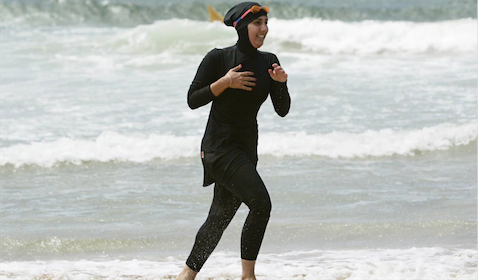
By BENJAMIN ROCHETEAU
Staff Writer
Huge controversy erupted across the globe this summer when 30 French mayors decided to ban the burkini from public beaches, shortly after a terrorist attack in Nice claimed the lives of 80 people. American, British, and other leaders condemned this decision, and the French equivalent of the Supreme Court, le Conseil d’Etat, has gone against it as well. To the rest of the world, this is a blatant act of oppression and persecution towards Muslims, but to the French, it is an understandable and defendable decision.
In Muslim society, women have to cover their bodies in hijab, or veils, to please their God and be accepted into Muslim society. Classical hijabs, however, can be limiting when it comes to certain activities like swimming or going to the beach. So, when Australian stylist Aheda Zanetti designed the burkini, a swimsuit which also fills the requirements of a hijab, the problem seemed solved.
France has a long history of conflict with the Catholic Church beginning in feudal France and continuing into the French Revolution. The conflict came to a head in 1905, when France suddenly cut off diplomatic relations with the Vatican, and then passed the Law of the 9 December 1905, which officially separated Church and State.
In the Law of 1905, attire is mentioned nowhere at all, and it is stressed that while secularism applies to public authorities, it does not affect, in any way, the public. So, if secularism is not the cause of these bans, what is? Well, the mayors claim that it is for public safety, as the burkinis allegedly causes tension among the non-Muslims, although studies have found no signs of tension caused by people wearing burkinis. They also claim that since the burkinis clearly show the religion of the wearer, it should be considered as religious clothing.
According to French lawyer François-Henri Briard, the decision of the Conseil d’Etat appears wise and measured in that it censures the grave and obviously illegal infringement on three liberties: the liberty to come and go, the liberty of conscience, and personal liberty, especially considering that the mayor was incapable of proving the existence of public tensions.(Le Point) So, unless the burkinis are proven to be a safety hazard or unhygienic, the government cannot place a ban on burkinis. Even if the burkinis are proved to be hazardous for one’s health or safety, bans should only be in place if they put others in danger, for one can do as they wish, as long as they do not infringe on other’s rights.
Jean-Paul Carvalho, author of the publication Veiling, and economist at UCI, proposes that wearing the burkini, a form of veiling, is a way for muslim women to “commit to abiding by religious norms of behavior and is also a public signal of this commitment.” This enables women to enjoy leisure activities, such as bathing and swimming, without losing esteem in their communities. Professor Carvalho states that “ [bans] can lead to a rise in religiosity in these communities.” If veiling is mainly positive to the veiler, and not negative to those around them, why do lawmakers take such a negative stance? And, if their overall goal is to discourage public demonstrations of religion, aren’t their actions counterproductive? According to Professor Carvalho, policymakers have been motivated by the view that “[burkinis] are religious symbols which violate France’s tradition of secularism [and] they are forms of conspicuously religious behavior that place undue pressure on secular Muslim women to conform.”
Their logic, however, is flawed, because, as stated above, laïcité encourages religious freedom, and does not affect the clothing of the public. And, while conspicuously religious, veiling should not be banned on the premises of the pressure it places on Muslim women, because under that same logic, there would be bans on advertising, propaganda, and society in general, all of which puts pressure on people to conform. Veiling is no different than wearing a brand t-shirt with that brand’s logo on it. The t-shirt says that you are a supporter of the brand, and its ideals, and veiling says that you are a Muslim, and support Islam’s ideals. Is it wrong to want to express your beliefs? Overall, the bans are clearly illegal, but maybe the fact that people could have thought it was not is the real issue here. It shows that the laws defining the boundaries of French secularism are either not well defined, too vague, or non-existent, all of which are major problems which the government should take into consideration and solve. If there were clear laws defining to which parts of society laïcité applies to, the mayors of the 30 French towns who banned the burkini would have known that their decision was out of line and not supported by the law.
The Limits of Secularism: The Burkini Controversy
September 6, 2016

Source: Google Images
1
0
Donate to Sword & Shield
$180
$1000
Contributed
Our Goal
Your donation will support the student journalists of University High School. Your contribution will allow us to purchase equipment and cover our annual website hosting costs.
More to Discover














What Is A Name After All? • Sep 18, 2016 at 3:39 pm
Great post, I completely agree. This ban really upsets me and I truly hope French Government realizes this is illogical and illegal!